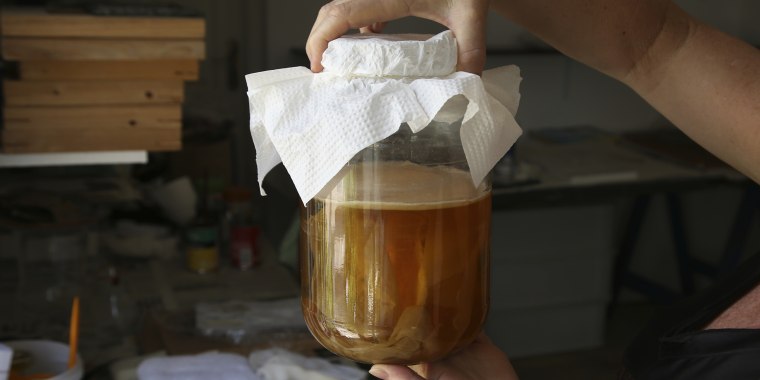If you just read that and said “kom-what?” to yourself, don’t worry. You’re definitely not alone. Even though kombucha has become somewhat an “it-drink” over the past few years, not everyone knows what it actually is.
So, what exactly is kombucha?
Kombucha is a fermented tea. This means that it’s a tea that has a culture of bacteria and yeast added. The addition of the bacteria and yeast causes fermentation, which adds probiotic benefits to the brew.
Die-hard fans make kombucha at home, but many people are squeamish about the process since it entails using a symbiotic colony of bacteria and yeast that resembles a jellyfish. You also have to be super meticulous about keeping everything sterile. The process involves brewing tea, adding sugar and then adding the bacteria and yeast which starts the fermentation process by feeding on the sugar.
So, what does it taste like?
Kombucha has a slightly fizzy, sweet and sour flavor.
Now, back to the original question: Is kombucha good for us?
Kombucha provides probiotics, a source of “friendly” bacteria that may help improve how the gastrointestinal tract functions. Real fermented foods are associated with a healthy gut, which in turn is associated with a stronger immune system, mental health benefits and reducing chronic inflammation.
Aside from being rich in probiotics, kombucha also provides antioxidants, which offer a host of health benefits.
Finally, it’s dairy-free, making it a good option for vegans and those who are lactose-intolerant as compared to kefir, another fermented beverage. Note: The fermentation process does produce very small amounts of alcohol (a bottled kombucha usually contains around 1%), which is pretty negligible but important to note for anyone specifically avoiding alcohol.
Are there any health concerns about kombucha?
Sugar is the main issue when it comes to kombucha. There’s really no need for any serving to have more than 5 grams (many companies count one bottle as two servings so read labels carefully).
If you’re buying your kombucha and not making it on your own, you’ll also want to make sure your choice comes with a simple ingredient list: tea, a sugar source (the yeast eats the sugar to ferment the tea, so some sugar will always be added) and some acknowledgement of “live cultures.” The only other ingredients on the list should be whole-food health add-ins like ginger, turmeric or lemon juice.
You also want to make sure the brand you are drinking isn’t pasteurizing its bottles. Like many nutrients, the probiotics in kombucha cannot survive pasteurization, so you’ve got to drink it unpasteurized form.
There are many great brands that are brewing high-quality, delicious kombucha that’s good for your gut. But as the market grows, there are also brands that take shortcuts (like adding probiotics in at the end instead of brewing real kombucha) or that add lots of unnecessary sugar for flavor. So, be sure to read your labels carefully.

